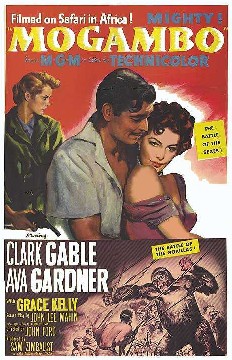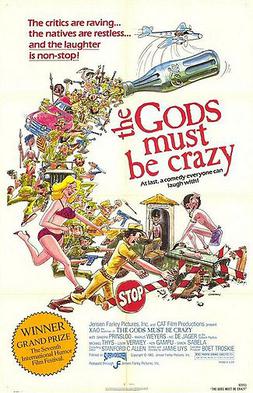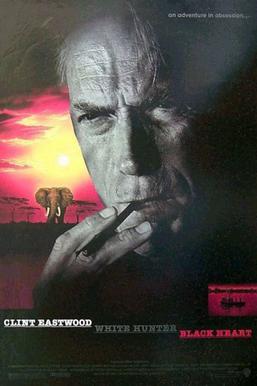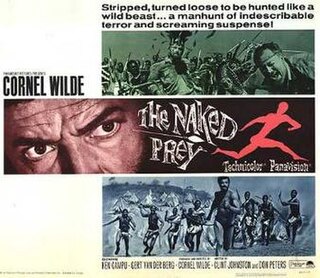
Mogambo is a 1953 Technicolor adventure/romantic drama film directed by John Ford and starring Clark Gable, Ava Gardner, and Grace Kelly, and featuring Donald Sinden. Shot on location in Equatorial Africa, with a musical soundtrack consisting entirely of actual African tribal music recorded in the Congo, the film was adapted by John Lee Mahin from the play Red Dust by Wilson Collison. The picture is a remake of Red Dust (1932), which was set in Vietnam and also starred Gable in the same role.

The Gods Must Be Crazy is a 1980 comedy film written, produced, edited and directed by Jamie Uys. An international co-production of South Africa and Botswana, it is the first film in The Gods Must Be Crazy series. Set in Southern Africa, the film stars Namibian San farmer Nǃxau ǂToma as Xi, a hunter-gatherer of the Kalahari Desert whose tribe discovers a glass Coca-Cola bottle dropped from an aeroplane, and believe it to be a gift from their gods. When Xi sets out to return the bottle to the gods, his journey becomes intertwined with that of a biologist, a newly hired village school teacher, and a band of guerrilla terrorists.

The San peoples, or Bushmen, are the members of the indigenous hunter-gatherer cultures of southern Africa, and the oldest surviving cultures of the region. Their ancestral territories span Botswana, Namibia, Angola, Zambia, Zimbabwe, Lesotho and South Africa. They speak, or their ancestors spoke, languages of the Khoe, Tuu and Kxʼa language families, and are only a 'people' in contrast to pastoralists such as the Khoekhoe and descendants of more recent waves of immigration such as the Bantu, Europeans and Asians.

South Africa is known for its ethnic and cultural diversity. Almost all South Africans speak English to some degree of proficiency, in addition to their native language, with English acting as a lingua franca in commerce, education, and government. South Africa has eleven official languages, but other indigenous languages are spoken by smaller groups, chiefly Khoisan languages.

Maun is the fifth-largest town in Botswana. As of 2011, it had a population of 55,784. Maun is the "tourism capital" of Botswana and the administrative centre of Ngamiland district. Francistown and Maun are linked by the A3 highway. It is also the headquarters of numerous safari and air-charter operations who run trips into the Okavango Delta.

White Hunter Black Heart is a 1990 American adventure drama film produced, directed by, and starring Clint Eastwood and based on the 1953 book of the same name by Peter Viertel. Viertel also co-wrote the script with James Bridges and Burt Kennedy. The film is a thinly disguised account of Viertel's experiences while working on the 1951 film The African Queen, which was shot on location in Africa at a time when location shoots outside of the United States for American films were very rare. The main character, brash director John Wilson is based on real-life director John Huston. Jeff Fahey plays Pete Verrill, a character based on Viertel. George Dzundza's character is based on African Queen producer Sam Spiegel. Marisa Berenson's character Kay Gibson and Richard Vanstone's character Phil Duncan are based on Katharine Hepburn and Humphrey Bogart, respectively. This was the last film that James Bridges wrote the screenplay for before dying in 1993.

Sir Laurens Jan van der Post, was a South African Afrikaner writer, farmer, soldier, educator, journalist, humanitarian, philosopher, explorer and conservationist. He was noted for his interest in Jungianism and the Kalahari Bushmen, his experiences during World War II, as well as his relationships with notable figures such as the future King Charles III and British Prime Minister Margaret Thatcher. After his death, there was controversy over claims that he had exaggerated many aspects of his life, as well as his sexual abuse and impregnation of a 14-year-old girl.

Tippi Benjamine Okanti Degré is a French woman best known for spending her youth in Namibia among wild animals and tribes people. In 1997, she was the protagonist of Le Monde selon Tippi, filmed in Namibia and Botswana. When she was 10, Degré wrote Tippi My Book of Africa. In 2002–03, she was the presenter of Around the World with Tippi, six wildlife and environmental TV documentaries.
"Simpson Safari" is the seventeenth episode of the twelfth season of the American animated television series The Simpsons. It first aired on the Fox network in the United States on April 1, 2001. When the Simpsons run out of food thanks to a bag boy strike, the family finds an old box of Animal Crackers in their attic. In the box is a golden cracker that was part of a contest conducted by the owners of Animal Crackers. Finding out that anyone that found the golden cracker would win a trip to Africa, Homer shows it to the company's owners, who refuse to honor the prize. When he is injured by one of the box's sharp corners however, the family is given a free trip to Africa as compensation.

White hunter is a literary term used for professional big game hunters of European descent, from all over the world, who plied their trade in Africa, especially during the first half of the 20th century. The activity continues in the dozen African countries which still permit big-game hunting. White hunters derived their income from organizing and leading safaris for paying clients, or from the sale of ivory.

The Naked Prey is a 1965 American adventure film produced and directed by Cornel Wilde, who also stars in the lead role. Set in the South African veldt, the film's plot centers around a safari guide trying to survive in the veldt's harsh environment, while trying to avoid death at the hands of vengeful African warriors. The story is loosely based on the experiences of American explorer John Colter. The acclaimed screenplay earned writers Clint Johnson and Don Peters an Academy Award nomination for Best Original Screenplay.

The Iziko South African Museum is a South African national museum located in Cape Town. The museum was founded in 1825, the first in the country. It has been on its present site in the Company's Garden since 1897. The museum houses important African zoology, palaeontology and archaeology collections.

John Kennedy Marshall was an American anthropologist and acclaimed documentary filmmaker best known for his work in Namibia recording the lives of the Juǀʼhoansi.

Survival is one of television's longest-running and most successful nature documentary series. Originally produced by Anglia Television for ITV in the United Kingdom, it was created by Aubrey Buxton, a founder director of Anglia TV, and first broadcast in 1961. Survival films and film-makers won more than 250 awards worldwide, including four Emmy Awards and a BAFTA.

The Riders of German East Africa is a 1934 German war film directed by Herbert Selpin and starring Sepp Rist, Ilse Stobrawa and Rudolf Klicks. It was shot at the Terra Studios in Berlin and on location at the sand dunes at Marienhöhe in the capital, a former quarry which stood in for Africa. The film's sets were designed by the art directors Robert A. Dietrich and Bruno Lutz. It was based on the novel Kwa Heri by Marie Luise Droop. Although produced as an anti-British propaganda film, it was later banned by the Nazi authorities after the outbreak of the Second World War for not being hostile enough to Britain, while it was also subsequently banned by the Allies in the post-war era for its promotion of militarism.

Claude Flemming (1884–1952) was an Australian actor, writer, producer and director of theatre and film whose varied stage career spanned the first half of the 20th century. He performed in Shakespeare and other drama, as well as opera, and became a music comedy specialist.
Terra Film was a Berlin-based film production company. Founded in 1919, it became one of Germany's largest film production companies in the 1930s under the Nazi regime.
Banjo Timothy Mosele is a guitarist, singer and composer born in Kanye, Botswana.

Mel Lawrence was an American film director and producer and former concert and festival promoter. He is best known for his role as the Director of Operations at the Woodstock Festival, his work on the Qatsi Trilogy, and for directing and producing the Emmy-nominated documentary Paha Sapa: The Struggle for the Black Hills.















